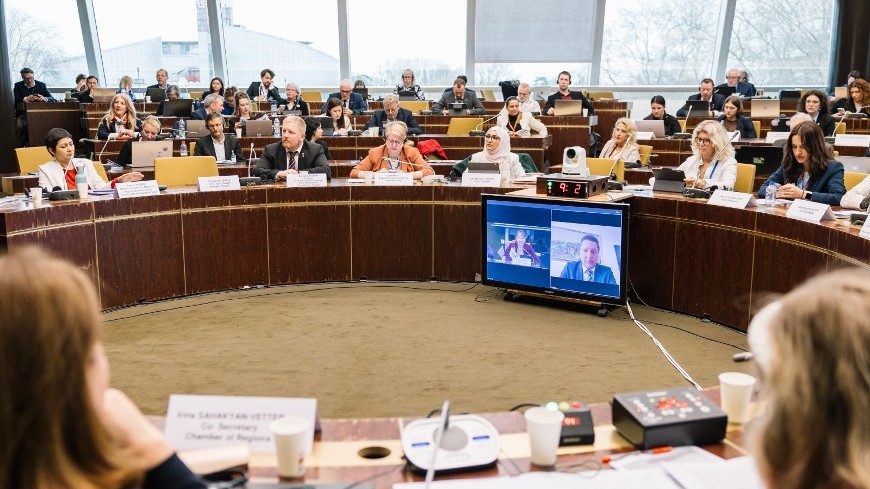While water is the basis of all life, our societies are not always sufficiently aware of the urgent need to protect it or the consequences of its disappearance: although recognised by the UN as a fundamental human right, access to water is still all too often hindered or flouted, according to the participants in the debate on “Right to water under threat: what is at stake for territories?” held on 27 March at the Chamber of Regions.
Sustainable water management was possible only under a cross-border, interregional approach, said Gunn Marit Helgesen (R, Norway, EPP/CCE) on opening the debate before giving the floor to Tatiana Obydenna, First Deputy Mayor of Nikopol in Ukraine. The destruction of the Kakhovka dam by Russian troops in June 2023 had deprived the city of all water supplies for almost two months, in the midst of the summer heat, and further increased the threats to the Zaporizhzhia nuclear power plant. Nikopol had managed gradually to restore its access to water by digging around forty drinking water wells, thanks to European and international assistance, including from its partner towns, in particular Leverkusen in Germany. However, the destruction of the dam further aggravated the catastrophic environmental damage linked to the Russian aggression against Ukraine, as was stressed by several other Ukrainian elected representatives during the debate. According to Mykola Lukashuk (R, Ukraine, ILDG), Russia had committed ecocide which was now depriving all of southern Ukraine of water, and the flooding resulting from the disappearance of the reservoirs would further complicate the country’s reconstruction. Svitlana Bohatyrchuk Kryvko (R, Ukraine, CRE/ECR) also stressed that the pollution caused by the war was spreading everywhere and ultimately affected the whole of Europe.
Youth delegates propose practical water protection measures
Apart from the tragic example of Kakhovka, the risks surrounding the increasing scarcity of water are a challenge for the whole world. Global warming and rising temperatures, excessive pumping and inappropriate infrastructure, as well as poor governance of resources and pollution of all kinds, in particular agricultural, are all playing a part in making water an increasingly threatened commodity. In a very detailed presentation, the Portuguese youth delegate, Debora Gonçalves, highlighted the potential environmental and health consequences of water shortages, while stressing that they also threatened societies’ political stability and could lead to serious conflicts. “We must not forget how urgent an issue water is,” she added, before setting out several measures proposed by all the youth delegates, in particular the reuse of non-potable water for farming and the application of sustainable development principles across the board in water management. Instead of penalties directed at individuals, the youth delegates also suggested that tax rebates should be granted to families willing to reduce their water consumption voluntarily. In conclusion, she said that the increasingly frequent pollution-related cuts in water supplies should give people cause for thought, as in the case of the water rationing imposed on two days out of three in recent months on the French island of Mayotte.
Protecting the environment also means preserving peace
During the debate, Eirini Douro (R, Greece, SOC/G/PD) called for the right to water to be enshrined in national constitutions, while pointing out that efforts to combat harm to the environment had to go hand in hand with the preservation of peace. Peter Drenth (R, Netherlands, EPP/CCE) also stressed the links between peace and the environment, before Heiner Klemp (R, Germany, SOC/G/PD) raised the issue of the worrying fall in water table levels and called for a reduction in water consumption, not only by the agricultural sector but also by industry and the general public. His home region of Brandenburg, on the border with Poland, had been directly affected in August 2022 by a sharp drop in water table levels, which had increased salinity in the water and caused an unprecedented mass die-off of fish in the River Oder.
***




